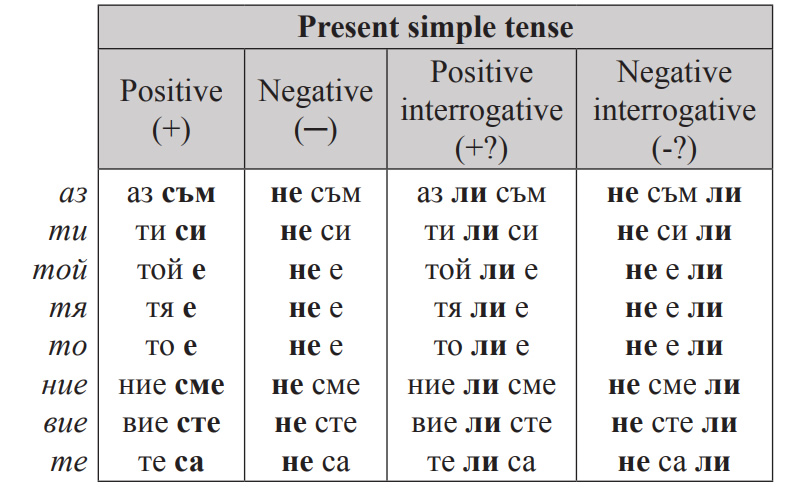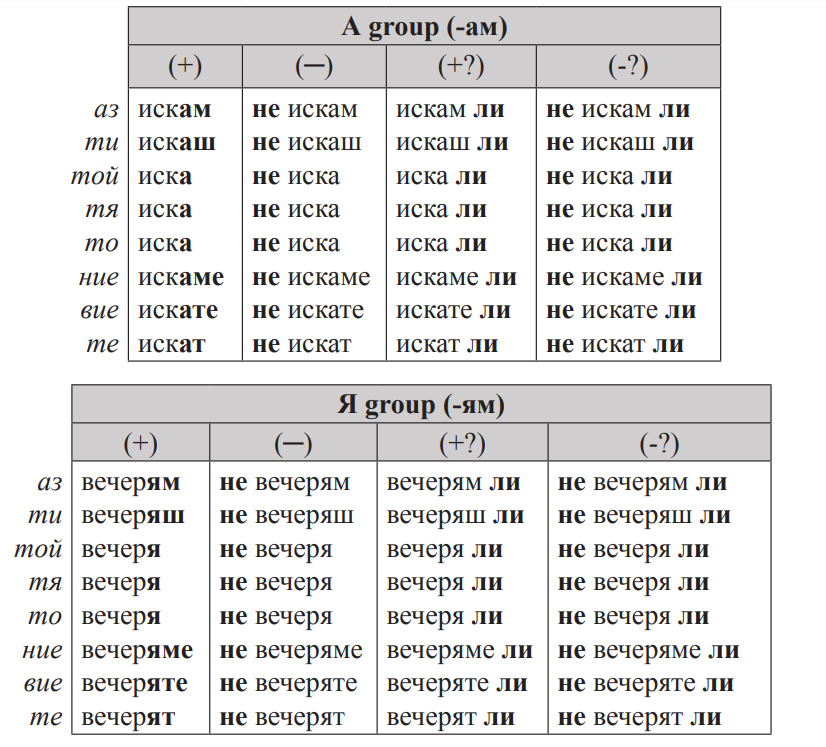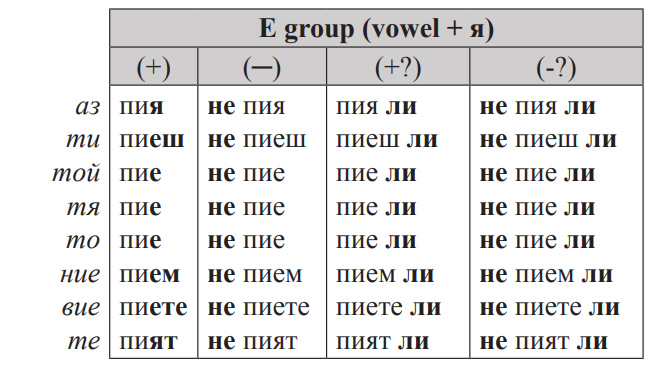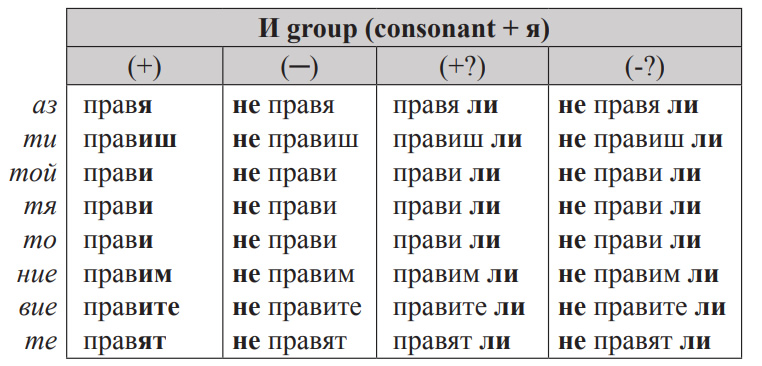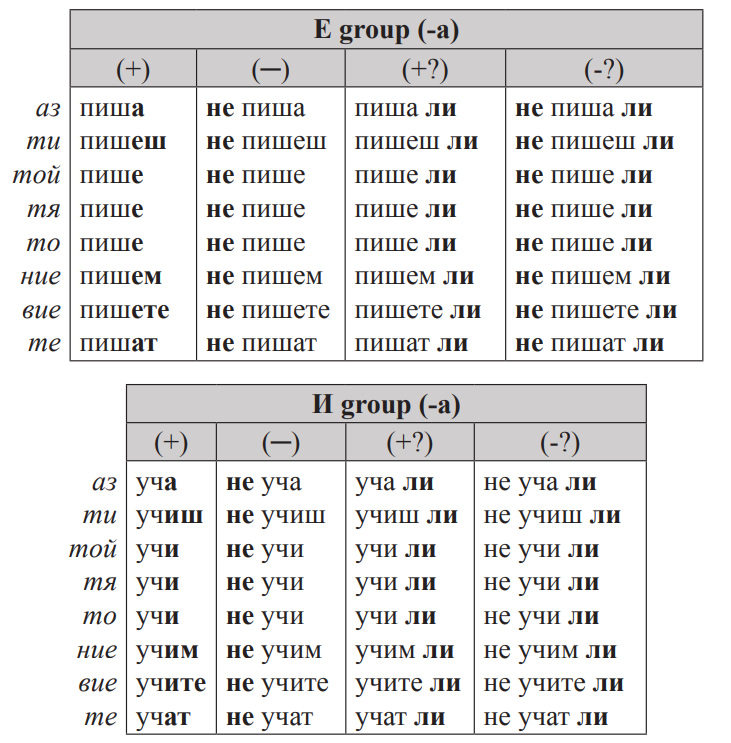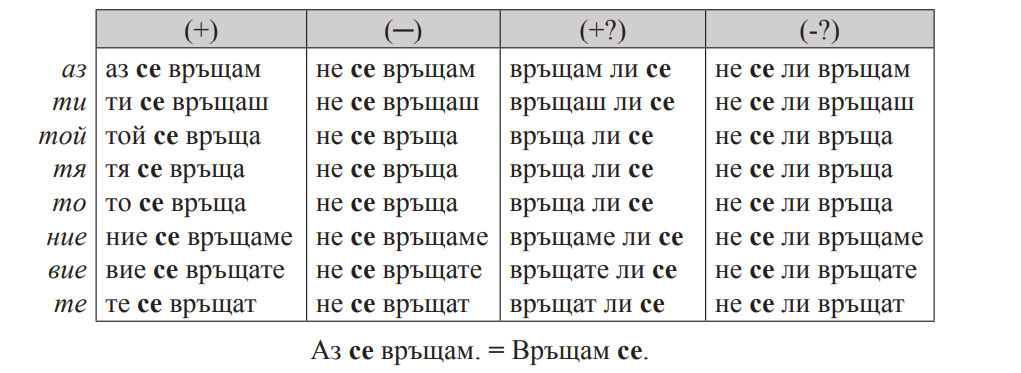Difference between revisions of "Language/Bulgarian/Grammar/PRESENT-SIMPLE-TENSE-–-Сегашно-време"
m (Quick edit) |
m (Quick edit) |
||
| Line 2: | Line 2: | ||
{{Bulgarian-flag}} | {{Bulgarian-flag}} | ||
<nowiki>*</nowiki> <small>The name of the tense is Bulgarian is Present Tense but Present Simple Tense is the closest corresponding English tense to it.</small> | <nowiki>*</nowiki> <small>The name of the tense is Bulgarian is Present Tense but Present Simple Tense is the closest corresponding English tense to it.</small> | ||
'''здрасти''', Bulgarian Learners! 😃 | '''здрасти''', Bulgarian Learners! 😃 | ||
➡ In today's lesson you will learn how to use the Present Tense in the Bulgarian language. | ➡ In today's lesson you will learn how to use the Present Tense in the Bulgarian language. | ||
Happy learning! | Happy learning! | ||
__TOC__ | __TOC__ | ||
==3 persons== | ==3 persons== | ||
Verbs in Bulgarian have three persons – 1st, 2nd, and 3rd – and two numbers – singular and plural. | Verbs in Bulgarian have three persons – 1st, 2nd, and 3rd – and two numbers – singular and plural. | ||
==No infinitive form== | ==No infinitive form== | ||
Verbs in Bulgarian do not have an infinitive form. Therefore the 1st person singular in present simple tense is used as a basic form of the verb. | Verbs in Bulgarian do not have an infinitive form. Therefore the 1st person singular in present simple tense is used as a basic form of the verb. | ||
==Irregular verb "to be"== | ==Irregular verb "to be"== | ||
The present simple tense of the verb “to be” is formed in an irregular way. | The present simple tense of the verb “to be” is formed in an irregular way. | ||
[[File:Bulgarian-Language-Present-Tense1-PolyglotClub.jpg]] | [[File:Bulgarian-Language-Present-Tense1-PolyglotClub.jpg]] | ||
| Line 34: | Line 24: | ||
==3 groups or conjugations of verbs== | ==3 groups or conjugations of verbs== | ||
There are three groups or conjugations of verbs in the Bulgarian language: A/Я group (3rd conjugation), E group (1st conjugation), and И group (2nd conjugation). | There are three groups or conjugations of verbs in the Bulgarian language: A/Я group (3rd conjugation), E group (1st conjugation), and И group (2nd conjugation). | ||
==Skip the personal pronouns== | ==Skip the personal pronouns== | ||
We often skip the personal pronouns, as the grammatical person and number are clear by the form of the verb. | We often skip the personal pronouns, as the grammatical person and number are clear by the form of the verb. | ||
==3rd conjugation== | ==3rd conjugation== | ||
A/Я group (3rd conjugation) – All the verbs from the A/Я group end in -АМ/-ЯМ in 1st person singular. | A/Я group (3rd conjugation) – All the verbs from the A/Я group end in -АМ/-ЯМ in 1st person singular. | ||
[[File:Bulgarian-Language-Present-Tense2-PolyglotClub.jpg]] | [[File:Bulgarian-Language-Present-Tense2-PolyglotClub.jpg]] | ||
Some verbs from this group are: вечерям, забравям, закусвам, затварям, искам, казвам, казвам се, купувам, обичам, харесвам, обядвам, отварям, отговарям, отивам, разбирам. | Some verbs from this group are: вечерям, забравям, закусвам, затварям, искам, казвам, казвам се, купувам, обичам, харесвам, обядвам, отварям, отговарям, отивам, разбирам. | ||
==1st conjugation== | ==1st conjugation== | ||
E group (1st conjugation) – Many of the verbs from the Е group end in a vowel + Я in 1st person singular. | E group (1st conjugation) – Many of the verbs from the Е group end in a vowel + Я in 1st person singular. | ||
[[File:Bulgarian-Language-Present-Tense3-PolyglotClub.jpg]] | [[File:Bulgarian-Language-Present-Tense3-PolyglotClub.jpg]] | ||
Some verbs from this group are: желая, зная/знам, играя, мечтая, мия (се), мога, пея, пия, пиша, смея се, чета. Exception: ям – аз ям, ти ядеш, той/тя/ то яде, ние ядем, вие ядете, те ядат. | Some verbs from this group are: желая, зная/знам, играя, мечтая, мия (се), мога, пея, пия, пиша, смея се, чета. Exception: ям – аз ям, ти ядеш, той/тя/ то яде, ние ядем, вие ядете, те ядат. | ||
==2nd conjugation== | ==2nd conjugation== | ||
И group (2nd conjugation) – Almost all of the verbs from the И group end in a consonant + Я in 1st person singular. | И group (2nd conjugation) – Almost all of the verbs from the И group end in a consonant + Я in 1st person singular. | ||
[[File:Bulgarian-Language-Present-Tense4-PolyglotClub.jpg]] | [[File:Bulgarian-Language-Present-Tense4-PolyglotClub.jpg]] | ||
Some verbs from this group are: вървя, говоря, готвя, каня, мисля, моля, мълча, правя, работя, свиря, търся, уча, ходя. | Some verbs from this group are: вървя, говоря, готвя, каня, мисля, моля, мълча, правя, работя, свиря, търся, уча, ходя. | ||
==Verbs ending in consonant + A in 1st person singular== | ==Verbs ending in consonant + A in 1st person singular== | ||
Verbs ending in consonant + A in 1st person singular belong either to E group or to И group. | Verbs ending in consonant + A in 1st person singular belong either to E group or to И group. | ||
[[File:Bulgarian-Language-Present-Tense5-PolyglotClub.jpg]] | [[File:Bulgarian-Language-Present-Tense5-PolyglotClub.jpg]] | ||
==placement of the reflexive pronoun CE== | ==placement of the reflexive pronoun CE== | ||
Pay attention to the placement of the reflexive pronoun CE. | Pay attention to the placement of the reflexive pronoun CE. | ||
[[File:Bulgarian-Language-Present-Tense6-PolyglotClub.jpg]] | [[File:Bulgarian-Language-Present-Tense6-PolyglotClub.jpg]] | ||
==When do we use simple tense?== | ==When do we use simple tense?== | ||
| Line 95: | Line 65: | ||
* a habit or repeated action | * a habit or repeated action | ||
* an activity happening now | * an activity happening now | ||
==Used with adverbs of frequency== | ==Used with adverbs of frequency== | ||
Present simple tense is often used with adverbs of frequency: винаги, обикновено, често, понякога, рядко, никога | Present simple tense is often used with adverbs of frequency: винаги, обикновено, често, понякога, рядко, никога | ||
==Videos== | ==Videos== | ||
| Line 108: | Line 75: | ||
=== Questions in the Present Tense - Въпроси в сегашно време ... === | === Questions in the Present Tense - Въпроси в сегашно време ... === | ||
<youtube> https://www.youtube.com/watch?v=IJCJFt0X1jg </youtube> | <youtube> https://www.youtube.com/watch?v=IJCJFt0X1jg </youtube> | ||
==Sources== | ==Sources== | ||
* https://caritas.bg/cms/wp-content/uploads/2015/04/A1-English.pdf?x10535 | * https://caritas.bg/cms/wp-content/uploads/2015/04/A1-English.pdf?x10535 | ||
== | ==Other Lessons== | ||
* [[Language/Bulgarian/Grammar/Types-of-Questions-–-Видове-въпроси|Types of Questions – Видове въпроси]] | * [[Language/Bulgarian/Grammar/Types-of-Questions-–-Видове-въпроси|Types of Questions – Видове въпроси]] | ||
* [[Language/Bulgarian/Grammar/SHORT-POSSESSIVE-PRONOUNS-–-Кратки-притежателни-местоимения|SHORT POSSESSIVE PRONOUNS – Кратки притежателни местоимения]] | * [[Language/Bulgarian/Grammar/SHORT-POSSESSIVE-PRONOUNS-–-Кратки-притежателни-местоимения|SHORT POSSESSIVE PRONOUNS – Кратки притежателни местоимения]] | ||
| Line 128: | Line 94: | ||
* [[Language/Bulgarian/Grammar/PERSONAL-PRONOUNS-–-Лични-местоимения|PERSONAL PRONOUNS – Лични местоимения]] | * [[Language/Bulgarian/Grammar/PERSONAL-PRONOUNS-–-Лични-местоимения|PERSONAL PRONOUNS – Лични местоимения]] | ||
* [[Language/Bulgarian/Grammar/Adjectives|Adjectives]] | * [[Language/Bulgarian/Grammar/Adjectives|Adjectives]] | ||
<span links></span> | |||
Latest revision as of 13:58, 27 March 2023
* The name of the tense is Bulgarian is Present Tense but Present Simple Tense is the closest corresponding English tense to it.
здрасти, Bulgarian Learners! 😃
➡ In today's lesson you will learn how to use the Present Tense in the Bulgarian language.
Happy learning!
3 persons[edit | edit source]
Verbs in Bulgarian have three persons – 1st, 2nd, and 3rd – and two numbers – singular and plural.
No infinitive form[edit | edit source]
Verbs in Bulgarian do not have an infinitive form. Therefore the 1st person singular in present simple tense is used as a basic form of the verb.
Irregular verb "to be"[edit | edit source]
The present simple tense of the verb “to be” is formed in an irregular way.
3 groups or conjugations of verbs[edit | edit source]
There are three groups or conjugations of verbs in the Bulgarian language: A/Я group (3rd conjugation), E group (1st conjugation), and И group (2nd conjugation).
Skip the personal pronouns[edit | edit source]
We often skip the personal pronouns, as the grammatical person and number are clear by the form of the verb.
3rd conjugation[edit | edit source]
A/Я group (3rd conjugation) – All the verbs from the A/Я group end in -АМ/-ЯМ in 1st person singular.
Some verbs from this group are: вечерям, забравям, закусвам, затварям, искам, казвам, казвам се, купувам, обичам, харесвам, обядвам, отварям, отговарям, отивам, разбирам.
1st conjugation[edit | edit source]
E group (1st conjugation) – Many of the verbs from the Е group end in a vowel + Я in 1st person singular.
Some verbs from this group are: желая, зная/знам, играя, мечтая, мия (се), мога, пея, пия, пиша, смея се, чета. Exception: ям – аз ям, ти ядеш, той/тя/ то яде, ние ядем, вие ядете, те ядат.
2nd conjugation[edit | edit source]
И group (2nd conjugation) – Almost all of the verbs from the И group end in a consonant + Я in 1st person singular.
Some verbs from this group are: вървя, говоря, готвя, каня, мисля, моля, мълча, правя, работя, свиря, търся, уча, ходя.
Verbs ending in consonant + A in 1st person singular[edit | edit source]
Verbs ending in consonant + A in 1st person singular belong either to E group or to И group.
placement of the reflexive pronoun CE[edit | edit source]
Pay attention to the placement of the reflexive pronoun CE.
When do we use simple tense?[edit | edit source]
We use present simple tense to talk about:
- a fact
- a habit or repeated action
- an activity happening now
Used with adverbs of frequency[edit | edit source]
Present simple tense is often used with adverbs of frequency: винаги, обикновено, често, понякога, рядко, никога
Videos[edit | edit source]
Present Simple Tense - Сегашно просто време[edit | edit source]
Questions in the Present Tense - Въпроси в сегашно време ...[edit | edit source]
Sources[edit | edit source]
Other Lessons[edit | edit source]
- Types of Questions – Видове въпроси
- SHORT POSSESSIVE PRONOUNS – Кратки притежателни местоимения
- Personal Pronouns
- Negation
- Pronouns
- Comparatives and Superlatives
- DEMONSTRATIVE PRONOUNS – Показателни местоимения
- DEFINITE ARTICLE OF NOUNS – Членуване на съществителните
- DEFINITE ARTICLE OF ADJECTIVES – Членуване на прилагателните
- CARDINAL NUMERALS – Бройни числителни
- GENDER AND NUMBER OF ADJECTIVES – Род и число на прилагателните
- Plurals
- PERSONAL PRONOUNS – Лични местоимения
- Adjectives

